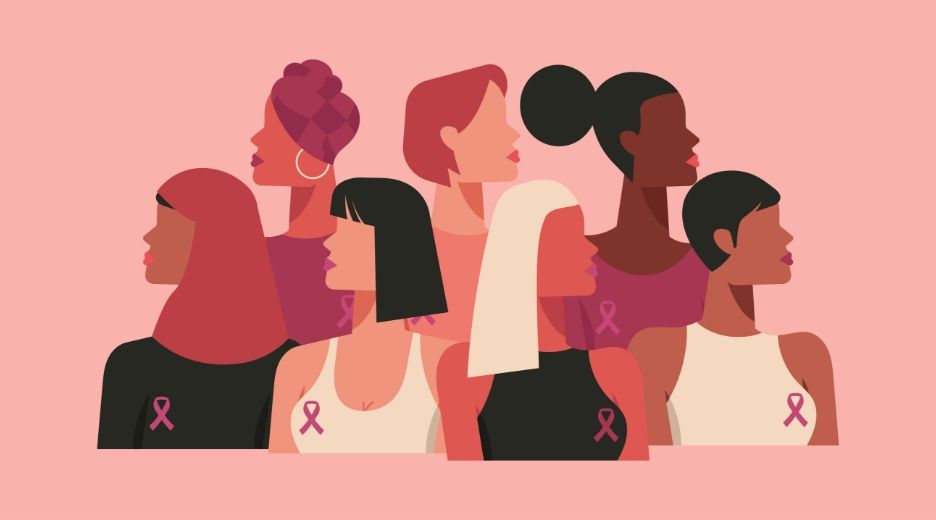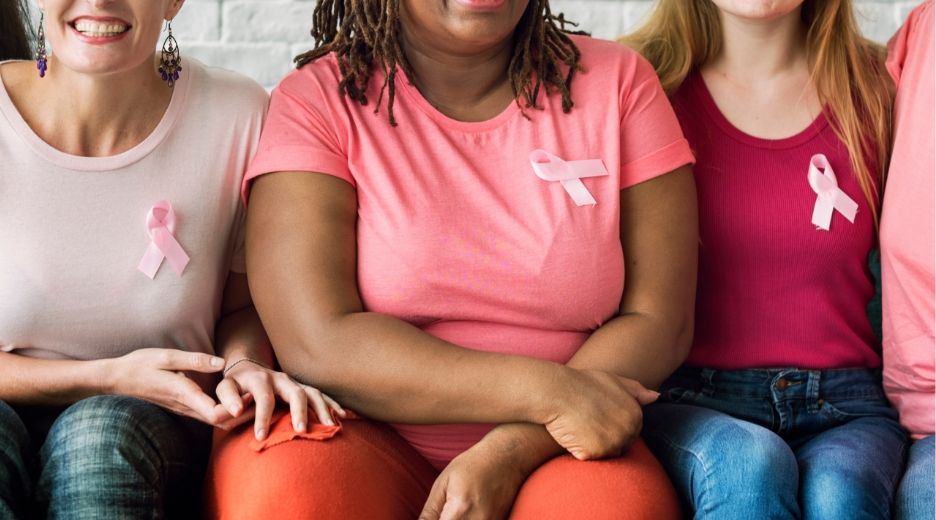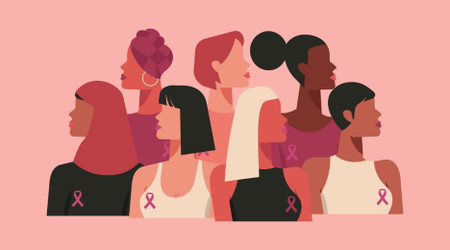Support the National Breast Cancer Foundation | BaseLayer
Oct 1st 2024

In a world as diverse as ours, there are few challenges that truly unite us across boundaries and identities. Yet, breast cancer stands as a poignant reminder that some adversaries recognize no gender, nationality or ethnicity. From the bustling streets of New York to the tranquil villages of Africa, from men to women, young and old, this disease has shown its indifferent might.
The National Breast Cancer Foundation's mission embodies this universality, working tirelessly not just to combat the ailment, but to bridge communities worldwide in the process. Understanding and supporting their efforts is imperative, for in this global fight, unity is our greatest strength. BaseLayer is proud to be a partner with the NBCF and their mission to raise breast cancer awareness.
This article will discuss how breast cancer impacts all nationalities and genders and will share why it's important to be a supporter of the NBCF.
IN THIS ARTICLE:
Breast Cancer: A Global Perspective
Why is breast cancer awareness important? Breast cancer knows no boundaries. It doesn't discriminate based on where you live, what language you speak, or the color of your passport. Its impact resonates with a universal echo that transcends borders. In this section, we'll explore how breast cancer has woven its narrative into the diverse tapestry of our global community.
Statistics and Prevalence
Breast cancer's prevalence is staggering, and the numbers speak for themselves. Each year in the United States, about 240,000 women and 2,100 men are diagnosed with breast cancer. This disease, once considered largely a concern of affluent nations, has firmly established its presence in regions around the world. In 2020, about 2.3 million women were diagnosed with breast cancer worldwide.
The statistics are humbling, reminding us that breast cancer is a global health issue that affects millions of lives. It’s a shared challenge that we must collectively confront, regardless of our nationality or cultural background.
Cultural and Regional Variations
While the numbers tell a global story, the experience of breast cancer varies significantly from one place to another. Cultural beliefs, healthcare infrastructure, and regional disparities all play a role in shaping the breast cancer journey.
In some cultures, discussing breast cancer openly remains taboo, leading to delayed diagnoses. In remote regions, access to proper healthcare facilities and cancer screenings can be limited. These variations highlight the importance of cultural sensitivity and tailored healthcare approaches when addressing breast cancer on a global scale.
Personal Stories
Behind each statistic is a personal story of courage, resilience, and hope. These stories showcase the universal nature of breast cancer’s impact. From urban centers to remote villages, individuals of all backgrounds face the challenges posed by this disease.
In this global fight, we must recognize that breast cancer is not just a health issue; it's a human issue. It affects our mothers, daughters, fathers, sons, friends, and neighbors, no matter where they call home. Understanding these global perspectives is essential to fostering unity and driving meaningful change in the fight against breast cancer.
Breast Cancer and Gender
Breast cancer, as a universal adversary, recognizes no gender boundaries. While it is predominantly associated with women, men are not exempt from its grasp.
Debunking Stereotypes
Who is at risk for breast cancer? The popular image of breast cancer often revolves around women. Pink ribbons, awareness campaigns, and mammograms are typically associated with the female experience of breast cancer. However, this limited perspective can lead to misconceptions and delayed diagnoses when it comes to men.
Men, too, can develop breast cancer. While the incidence is much lower in men than in women, it's essential to debunk the stereotype that breast cancer is solely a women's issue. By raising awareness about breast cancer in men, we can encourage early detection and improve outcomes.
The Importance of Early Detection and Awareness for All Genders
Breast cancer in men tends to be diagnosed at a more advanced stage, partly due to the lack of awareness and the misconception that it primarily affects women. Early detection, a cornerstone of successful breast cancer treatment, is critical for everyone.
Educating men about the signs and symptoms of breast cancer and encouraging regular self-examinations can make a significant difference. Likewise, promoting gender-inclusive breast cancer awareness campaigns ensures that men receive the information and support they need to protect their health.
NBCF's Initiatives for Gender-Inclusive Breast Cancer Awareness
The National Breast Cancer Foundation understands the importance of gender inclusivity in breast cancer awareness. They advocate for early detection and provide resources and support for individuals of all genders.
NBCF's initiatives extend beyond the traditional female-focused campaigns. They recognize that breast cancer affects the entire community and that gender inclusivity is essential in the fight against this disease. By supporting NBCF, you contribute to their efforts to raise awareness among men and ensure that no one is left behind in the battle against breast cancer.
Through their programs and outreach, NBCF encourages all individuals to prioritize their breast health. They emphasize that early detection saves lives, regardless of gender, and that every person's experience with breast cancer is valid and significant.
Breast Cancer and Nationalities
Breast cancer is a formidable adversary that transcends borders, affecting individuals from diverse nationalities and ethnic backgrounds. In this section, we delve into the global footprint of breast cancer and discuss how this disease manifests differently in various regions while highlighting the vital role played by organizations like the National Breast Cancer Foundation in addressing this worldwide challenge.

The Global Footprint
Breast cancer's global prevalence is undeniable. It doesn't discriminate based on geography or nationality. Whether you live in the bustling cities of the United States, the rural villages of India, or the serene landscapes of New Zealand, breast cancer can touch your life. Its universal reach serves as a stark reminder that we are all vulnerable to its effects, regardless of where we call home.
Statistics tell a powerful story. Breast cancer is the most common cancer among women worldwide, with millions of new cases diagnosed annually. These numbers underscore the urgent need for global awareness, prevention, and treatment efforts.
Socioeconomic Factors and Access to Healthcare
While breast cancer affects individuals from all walks of life, socioeconomic factors can significantly impact the disease's trajectory. Access to healthcare, early detection, and quality treatment can vary widely between countries and regions.
In some parts of the world, limited access to healthcare facilities, financial constraints, and cultural barriers can delay diagnoses and hinder treatment. This stark disparity underscores the importance of global initiatives that aim to bridge these gaps and ensure that individuals from all nationalities receive the care and support they need.
NBCF's International Outreach and Collaborations
The National Breast Cancer Foundation understands that breast cancer knows no borders. They actively engage in international outreach and collaborations to address the global challenge of breast cancer.
NBCF collaborates with healthcare organizations, advocacy groups, and governments worldwide to promote breast cancer awareness, early detection, and access to treatment. Their initiatives reach individuals in countries where breast cancer may be less discussed or stigmatized.
By supporting NBCF, you contribute to their efforts to raise awareness, provide resources, and offer support to individuals from diverse nationalities facing breast cancer. You help ensure that everyone, regardless of their background, has access to information and care.
NBCF's Crucial Role
The National Breast Cancer Foundation stands as a beacon of hope and a force for change in the global fight against breast cancer. Their mission and initiatives are instrumental in raising awareness, promoting early detection, and providing support to those affected by this disease.
Overview of NBCF's Mission and Initiatives
At the heart of NBCF's mission is a commitment to saving lives through breast cancer awareness and education. Their initiatives encompass a wide range of activities aimed at:
- Early Detection: NBCF emphasizes the importance of early detection as a cornerstone of successful breast cancer treatment. Through education and outreach programs, they empower individuals to be proactive about their breast health. NBCF's focus on early detection has led to countless lives being saved.
- Support Services: NBCF recognizes that a breast cancer diagnosis can be emotionally and financially challenging. They offer a network of support services, including patient navigation programs, to guide individuals through their breast cancer journey. These services provide valuable assistance to patients and their families, offering guidance and comfort during a difficult time.
- Research and Advocacy: NBCF is committed to advancing breast cancer research and advocacy efforts. They work tirelessly to ensure that policymakers prioritize breast cancer research funding and access to quality care. By advocating for change at the policy level, NBCF contributes to improving outcomes for breast cancer patients and survivors.
Impact and Achievements
NBCF's impact extends far and wide. Their dedication to early detection has resulted in countless breast cancers being discovered at earlier, more treatable stages. This translates into higher survival rates and improved quality of life for those affected by the disease.
Moreover, their support services provide a lifeline for individuals and families navigating the complexities of breast cancer. From emotional support to practical guidance, NBCF's resources help patients and their loved ones cope with the challenges of diagnosis and treatment.
Partnerships and Collaborations
NBCF understands that the fight against breast cancer requires a united front. They actively seek collaborations with healthcare organizations, research institutions, advocacy groups, and governments worldwide. These partnerships amplify their impact, ensuring that breast cancer awareness and support reach individuals in every corner of the globe.
By supporting NBCF, you contribute to these vital initiatives. BaseLayer understands the importance of these partnerships and does our part to play a role in these efforts. And anyone can help! Your involvement helps NBCF expand their reach, educate more individuals about breast cancer, and provide critical support services to those in need. It also fuels their research and advocacy efforts, driving progress in breast cancer prevention, treatment, and care.
The Power of Unity in the Fight Against Breast Cancer
Breast cancer, with its widespread impact, reminds us that some challenges are too significant to face alone. It is a disease that transcends individual experiences, communities, and borders, demanding a united response. In this section, we explore the profound effect of collective action in the battle against breast cancer and how individuals and organizations can join forces to make a real difference.
The Importance of Collective Action
Breast cancer's universal reach underscores the significance of collective action. Alone, its challenges may seem insurmountable, but together, we can achieve remarkable progress. Collective action brings together diverse voices, experiences, and resources, amplifying the impact of breast cancer awareness, support, and research efforts.
When individuals, communities, organizations, and governments work together, they create a powerful force for change. They raise awareness, promote early detection, provide support to those affected, and drive research to improve prevention and treatment.
The Role of Supporters and Advocates
Supporters and advocates play a pivotal role in the fight against breast cancer. They are the driving force behind awareness campaigns, fundraisers, and outreach initiatives. Whether you participate in a breast cancer walk, donate to breast cancer research, or share vital information about early detection, your actions contribute to the collective effort.
Advocates also use their voices to advocate for policy changes that can improve breast cancer prevention, diagnosis, and treatment. They ensure that breast cancer remains a priority on the global health agenda, driving positive change at the systemic level.
Getting Involved with NBCF
The National Breast Cancer Foundation offers numerous opportunities for individuals and organizations to get involved in the fight against breast cancer. By partnering with NBCF, you can become part of a dedicated community working to make a difference. As one of their proud supporters, BaseLayer has seen first hand the immediate impact that is made when you contribute to this foundation.
Here are some ways you can get involved with NBCF:
- Donate: Your financial support fuels NBCF's programs, research initiatives, and support services. Every contribution, no matter the size, makes a meaningful impact.
- Participate: Join NBCF's awareness campaigns, events, and fundraisers. These activities not only raise critical funds but also promote breast cancer awareness in your community.
- Advocate: Use your voice to advocate for breast cancer research funding, improved access to healthcare, and early detection initiatives. Your advocacy can drive policy changes that save lives.
- Volunteer: Consider volunteering your time and skills to support NBCF's mission. Volunteers play a vital role in organizing events, providing support services, and spreading awareness.
- Educate: Share information about breast cancer awareness, early detection, and support resources with your network. Education is a powerful tool in the fight against breast cancer.
Together We Can Make a Difference
Breast cancer's impact knows no boundaries, but neither does the power of unity. When individuals, communities, organizations, and governments come together, they create a force capable of effecting change on a global scale. Breast cancer awareness, early detection, support, and research efforts are significantly strengthened by collective action.
As we stand together in the fight against breast cancer, we recognize that our shared humanity is more powerful than any adversary. The National Breast Cancer Foundation serves as a unifying force, bringing diverse voices and resources together to combat this disease.
By supporting NBCF and participating in collective action, you become part of a global community dedicated to making a meaningful difference in the lives of those affected by breast cancer. Together, we can create a world where breast cancer is a thing of the past, and every individual, regardless of their nationality, gender, or background, can live a life free from its impact. Join BaseLayer as a partner with the NBCF to help increase breast cancer awareness and save lives!
Frequently Asked Questions About the National Breast Cancer Foundation
If you have questions about the NBCF and breast cancer awareness, we are here to help. We have answered a few of the most common questions we hear about our partners at the National Breast Cancer Foundation.
What Does the National Breast Cancer Foundation Do?
The National Breast Cancer Foundation provides support and education for those affected by breast cancer. The organization offers free mammograms, supports research, and provides educational resources to help individuals understand the disease.
When Was the National Breast Cancer Foundation Established?
The National Breast Cancer Foundation was established in 1991. - What Percentage of Breast Cancer Donations Go to Charity?
The percentage of breast cancer donations that go to charity can vary depending on the organization. For the National Breast Cancer Foundation specifically, approximately 80% of their total expenses went to programs that fulfill their mission.


